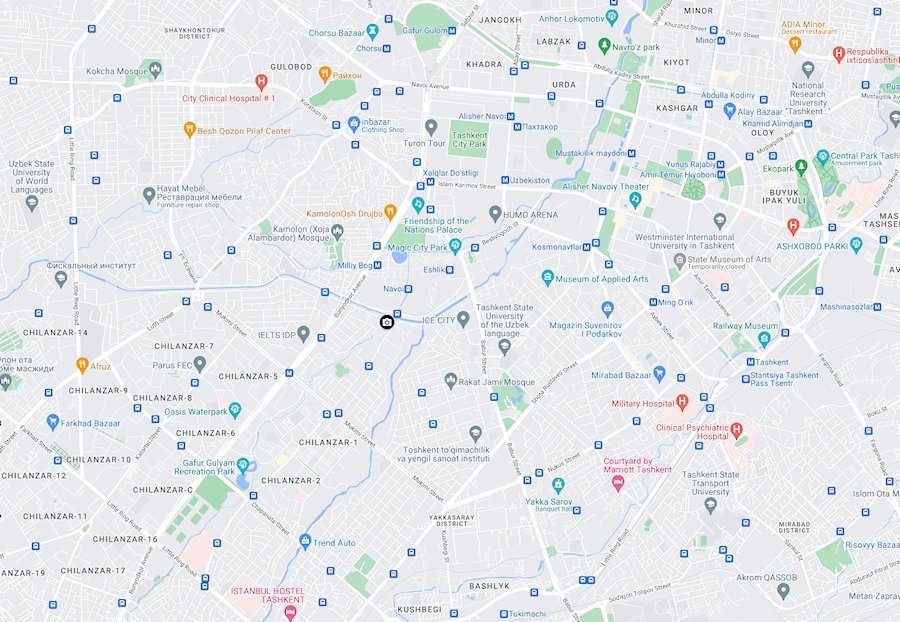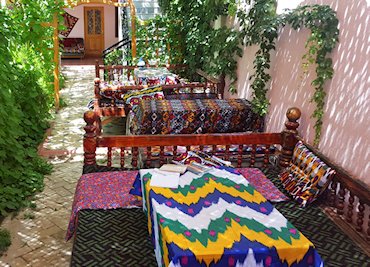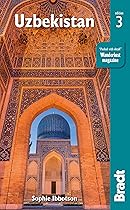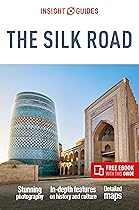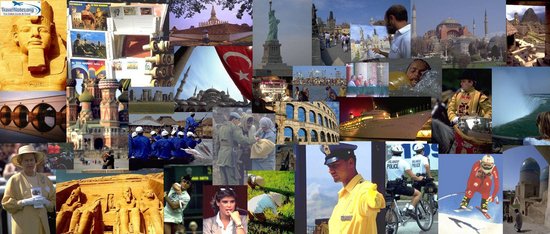Travel Notes: Asia - Uzbekistan Travel Notes.
Short URL: https://tnot.es/UZ
Uzbekistan Travel and Tourism on Travel Notes
Unforgettable Uzbekistan - Exotic Bazaars and Vibrant Street Life
Visit Uzbekistan's colourful bazaars and lively street markets. From handwoven textiles to intricate ceramics, savour sights, sounds and smells of Central Asia. Share on Facebook
About Uzbekistan
Uzbekistan is a country with a rich cultural heritage and a strategic location at the crossroads of Asia, making it a fascinating destination for traveilers and historians alike.
With a rich cultural history and many stunning architectural and historical sites, Uzbekistan has become an increasingly popular destination for tourists.
Countries neighbouring Uzbekistan: Afghanistan, Turkmenistan, Kazakhstan, Tajikistan, and Kyrgyzstan.
 Add a Business -
Add a Location -
Add a Lodging - Add Travel Content
- Add URL
- Travel Services.
Add a Business -
Add a Location -
Add a Lodging - Add Travel Content
- Add URL
- Travel Services.
Mapping Uzbekistan
Map of Uzbekistan
Uzbekistan was a former republic of the Union of Soviet Socialist Republics.
Together with Kazakhstan, Kyrgyzstan, Tajikistan and Turkmenistan it forms a region known as Central Asia.
Uzbekistan Overview
Uzbekistan is a landlocked country in Central Asia, bordered by Kazakhstan to the north, Kyrgyzstan to the north-east, Tajikistan to the south-east, Afghanistan to the south, and Turkmenistan to the south-west.
Uzbekistan's rich history daties back to ancient times, when it was a part of the Silk Road trade route connecting East and West.
Challenges
Uzbekistan faces various challenges, including political and human rights issues, economic diversification, and environmental concerns; such as the drying up of the Aral Sea due to excessive irrigation practices.
Culture
Uzbek culture is heavily influenced by its nomadic heritage and the legacy of the Silk Road.
The country is known for its rich tradition of craftsmanship, particularly in ceramics, textiles, and architecture.
Uzbek cuisine is also famous for dishes such as pilaf (plov), kebabs, and various types of bread.
Economy
Uzbekistan's economy relies heavily on agriculture, particularly cotton, as well as natural resources such as natural gas and gold.
In recent years, efforts have been made to diversify the economy and attract foreign investment.
Government
Uzbekistan has a presidential republic form of government, where the President is both the head of state and the head of government.
History
Uzbekistan has been inhabited for thousands of years and has been home to various ancient civilisations such as the Sogdians, Bactrians, and Khwarezmians.
It was also a part of the Persian Empire, Alexander the Great's empire, and later became a centre of Islamic culture under various Turkic dynasties, including the Timurid Empire.
Language
The official language of Uzbekistan is Uzbek, which is a Turkic language written in the Latin script since 1993; replacing the Cyrillic script that was used during the Soviet era.
Tourism
Uzbekistan is home to several historic cities along the Silk Road, including Samarkand, Bukhara, and Khiva; which are renowned for their stunning Islamic architecture, vibrant bazaars, and rich history.
These cities attract tourists interested in exploring their ancient monuments and cultural heritage.
Visiting Uzbekistan
Visiting Uzbekistan can be an incredible experience, offering a rich mix of history, culture, and natural beauty.
By immersing yourself in Uzbekistan's rich cultural heritage and warm hospitality, you're sure to create unforgettable memories of your visit to Central Asia.
Cultural Experiences
Crafts and Souvenirs
Shop for hand-crafted ceramics, textiles, and intricate woodwork at local markets and workshops.
Cuisine
Indulge in Uzbek cuisine, which features hearty dishes like plov (rice pilaf), shashlik (grilled meat skewers), and various types of bread, such as non and lepyoshka.
Traditional Music and Dance
Attend a performance of traditional Uzbek music and dance, where you can witness the vibrant rhythms of the region.
Places to Visit
Bukhara
Another ancient city along the Silk Road, Bukhara boasts well-preserved historic buildings like the Ark Fortress, Kalon Minaret, and the Samanid Mausoleum.
Fergana Valley
Explore the lush Fergana Valley, known for its picturesque landscapes, traditional crafts, and welcoming hospitality.
Khiva
Step back in time in this UNESCO World Heritage city, where you can wander through the narrow streets of the Itchan Kala fortress and admire the intricate tilework of the mosques and madrasas.
Samarkand
Known as the 'Pearl of the Orient', Samarkand is home to stunning architectural marvels such as the Registan Square, Shah-i-Zinda, and the Bibi-Khanym Mosque.
Tashkent
When in the capital city of Uzbekistan, explore the bustling Chorsu Bazaar, visit historical sites like the Khast Imam Complex and Independence Square, and appreciate the vibrant arts and crafts scene.
Practical Tips
Climate
Uzbekistan has a continental climate, with hot summers and cold winters.
Spring and autumn are the best times to visit, with milder temperatures and less extreme weather.
Currency
The currency used in Uzbekistan is the Uzbekistani som (UZS).
ATMs are available in major cities, but it's advisable to carry cash, especially in rural areas.
Language
While Uzbek is the official language, Russian is still spoken in some urban areas.
It might be helpful to learn a few basic phrases, in either language.
Transportation
Consider using trains or domestic flights to travel between cities in Uzbekistan.
Taxis and shared taxis (called 'marshrutkas') are common modes of transportation within cities.
Visa
Check the visa requirements for your country before traveling to Uzbekistan.
Visas are typically required for most visitors.
Cultural Etiquette
Dress Modestly
Respect local customs by dressing modestly in Uzbekistan, especially when visiting religious sites.
Gift Giving
It's customary to bring a small gift when visiting someone's home.
Chocolates, pastries, or souvenirs from your home country are appreciated.
Greetings
Greet people with a handshake and maintain eye contact.
Use formal titles and last names when addressing others, followed by "salam" (hello) or "assalomu alaykum" (peace be upon you).
Central Asia
Situated between the Amu Darya and Syr Darya rivers, Uzbekistan is roughly the size of California and lies at the heart of Central Asia.
Much of Uzbekistan is dry desert land (the Kara Kum desert), but it has rugged mountains and fertile valleys in the east, and irrigation has made much of the land habitable and productive.
Bordering Uzbekistan are Afghanistan to the south, Turkmenistan to the west and south, Kazakhstan to the north and east and Tajikistan and Kyrgyzstan to the east.
When to Visit Uzbekistan
The area has a severe continental climate that is dry and hot in the summer months and cool and wet in the winter.
Spring and fall are the most comfortable seasons to visit Uzbekistan.
In the long summer, temperatures often reach 40 degrees Celsius.
During the short winter, temperatures generally stay above freezing but in occasions can dip well below.
Uzbekistan History
Buddhism took hold and the Silk Road brought peaceful contact with the wider world.
Towns grew and the area became rich.
In the 6th century AD, Western Turks rode out of the steppes, bringing Islam and a written alphabet. When they moved on to greener pastures, Persia took over again, until Genghis Khan and his hordes rolled over the country.
With the rise of the ruthless warrior Timur in the 14th century, Uzbekistan again rose to prosperity and Samarkand became a glittering Islamic capital thanks to his patronage of the arts.
Around this time, certain Mongol tribes took the name Uzbek.
In the 14th century they began moving south, eventually conquering Timur's empire.
By 1510 they had control of everything from the Amu-Darya to the Syr-Darya, and they have maintained control ever since. In the early 18th century the khan of Khiva asked Peter the Great of Russia for aid in defending his land against Turkmen and Kazaks, stirring the first Russian interest in Central Asia.
However, by the time the Russians got around to marching on Khiva, the khan no longer wanted their help and massacred almost the entire army.
Apart from a few minor forays, the next major Russian excursion was made in 1839 by Tsar Nicholas I, who was eager to prevent British expansion in the area, but the mission was not a great success.
Twenty-five years later the Russians again made a serious move on Uzbekistan and by 1875 the region was theirs.
After the 1917 Russian Revolution, the Bolsheviks proclaimed the Autonomous Soviet Socialist Republic of Turkestan, despite the fact that most Central Asians defined themselves not by country, but as ethnic Turks or Persians.
In October 1924, Uzbekistan was declared, although it changed shape and size many times in the following decades.
For rural Uzbeks, Soviet rule meant forced collectivization of their farms, and a huge shift to cotton cultivation.
For the intelligentsia it meant devastating purges.
Tashkent
Map of Tashkent
The capital of Uzbekistan, which suffered a major earthquake in 1966, was the largest city of Soviet Central Asia; and it shows.
The Russians built up Tashkent around the old city, and many Russians still live here.
The real reason to go to Tashkent would be to venture on to Samarkand, Bukhara and Khiva.
Where to Stay in Tashkent
The Uzbeks
The Uzbeks are a Turkic-speaking people with an Islamic ancestry.
They seem to spend plenty of time in tea houses clutching little birds in their strong, sun- weathered hands.
Education in Uzbekistan
Uzbekistan is the state of youth. Children, teenagers and young people under the age of 25 comprise approximately 60% of the total population.
Language and Culture
Although Uzbek is the official language of Uzbekistan, Russian is also widely spoken in the cities, particularly among the educated elite and government officials.
The historical towns of Bukhara and Samarkand are primarily Tajik speaking, and in the countryside, Russian speakers are far less common.
The Uzbeks (as well as the Karakalpaks, Kazakhs, Kyrgyz, Turkmens and Tatars) are a Turkic people and speak a Turkic language.
The language and culture in Uzbekistan also has a strong Persian influence.
Uzbekistan Population
Uzbekistan has an estimated population of 23 million people. Of these, around 17 million are ethnic Uzbeks, almost two million are Russian, and a slightly smaller number, Tajik.
The rest of the population is made up of Tatars, Kazakhs, Kyrgyz, and Karakalpaks, along with over 100 other ethnic groups.
Most of the population lives in the eastern and southern part of the country, particularly the Fergana valley, Tashkent and Samarkand regions.
Bukhara
Considered a museum in and of itself, Bukhara has more than 140 architectural monuments, dating back to the Middle Ages.
Lyabi House:
Located in the heart of Bukhara and within walking distance from the ancient Labi Hauz
complex, this family run bed and breakfast type hotel offers comfortable accommodation in
national style. Also arranges camel rides and tours of Bukhara and other ancient cities of
Uzbekistan.
Khiva
Khiva is divided into the inner town, Ishan-Kala, where about 60 historical monuments are located and Dishan-Kala, the outer town, where citizens of Khiva live and work.
Where to Stay in Khiva
Samarkand
Where to Stay in Samarkand
Jahongir Guest House
Jahongir Guest House: Chirokchi 4, Samarkand.
An ideal place to stay for those who want to experience Uzbek national atmosphere.
Located in the heart of ancient Samarkand, the family-run Jahongir Hotel is just a five-mintue walk from Registan Square.
Malika Prime Hotel
Malika Prime Hotel: 1/4, University Blvd., Samarkand.
Located within easy walking distance of the main historical sites of Samarkand, the hotel's charm lies in its traditional woodwork design.
To add to the oriental flavour, authentic Uzbek cuisine is prepared in the Malika Prime Hotel restaurant.
Travel to Uzbekistan
Uzbekistan Airways:
The national airline of Uzbekistan.
Uzbekistan Embassy and Visas:
In general all foreign nationals are required to obtain a visa to enter Uzbekistan.
Uzbekistan Travel Guides
Uzbekistan Travel Guides - Uzbekistan Maps.
Weather in Asia:
Local weather forecasts for destinations around Asia.
|
|
More From Travel Notes
Travel Notes Online Guide to Travel
Africa - Asia - Caribbean - Europe - Middle East - North America - Oceania - South America.
The Travel Notes Online Guide to Travel helps visitors plan their trip with country and city travel guides, local tourist information, reviewed web sites, and inspiring travel content.
Travel and Tourism Guides on Travel Notes
 If you find Travel Notes useful, please take a moment to
like us on Facebook and share with your friends on social media.
If you find Travel Notes useful, please take a moment to
like us on Facebook and share with your friends on social media.
Share on Facebook
Travel Resources
.
Travel & Tourism With Industry Professionals.








